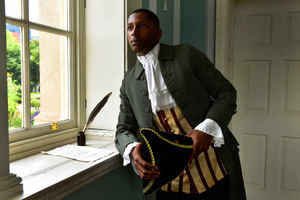Molineux family and former-slave George Africanus play staged in Georgian Rococo room at Wolverhampton archives
How can you encapsulate the history of the Molineux family as well as the life of their former slave, George Africanus in the space of 30 minutes?

Well, it turns out, it is in fact possible, by staging a short play in the very house that both the Molineux family and George himself lived in for many years.
Performed in the historic Georgian Rococo room at Wolverhampton archives this week, 'Surnamed Africanus' delivered all the tension and unspoken unease of George's situation as well as the duality of his relationship with his master and almost-father-figure, George Molineux.
Set in 1784, the play hones in on one particular moment of significance in the slave-boy's life, the moment he is told he is to depart to Nottingham to find his fortune.
Kyle Bell, as Africanus, delivered a subtle, pointed performance as his master struggled to deliver the news of his imminent departure.
George Molineux, played by Laurence Saunders, was a stern, authorative figure, however, he was also clearly a much-respected, caring man who sought, it seemed only to better his pseudo-son's life.
Katie O'Malley, as Polly Pavey was a sweet, loving young house maid, clearly in love with Africanus, heartbroken at his farewell.
As a snippet into the life of such significant figures in the history of Wolverhampton, the play showed us a little of what life must have been like for the family, who were given Africanus as a gift when he was just three years old.
Playwright and expert on the history of the family, Dr Jefny Ashcroft said: "One of the reasons I decided to dramatise the play in just 30 minutes, was to reflect how Africanus barely had a moment to collect his thoughts before he was told he was to leave Wolverhampton and head to Nottingham. This showed that despite the Molineux's benevolent wishes, that Africanus was still their slave."
The play also revealed how the Molineuxs taught Africanus to read and write, ensuring he was apprenticed into a trade before sending him to Nottingham with a letter of recommendation.
The play was accompanied by an exhibition of records revealing the Africanus' baptism certificate showing how he was baptised at St Peter's Church, as well as the original memorandum book of George Molineux. An intriguing document published in the Wolverhampton Chronicle also revealed that Africanus was in fact from Sierra Leone, given to the family and apprenticed as a brass founder. Africanus also featured in an oil painting by society artist Reinagle,where he is stood behind George surrounded by his hunting dogs. Africanus was also taught how to 'dress hair' including how to deal with wigs and powdering.
Africanus went on to become a respected member of English society, becoming Nottingham's first black entrepreneur. He worked as a brass founder when he arrived in the city, and four years later, he married local woman Esther Shaw, who is believed to have been white.
Together, they had seven children, six of which passed away. Due to his wealth and status - Africanus later opened his own brass foundry and owned many properties, he was allowed to vote, a privilege not afforded to his white working class peers.
Although some families treated their slaves very badly, it would appear then that the Molineuxs felt differently. This may explain why George and Esther had their daughter Sarah baptised at St Peters church (as well as in Nottingham!).
It was widely believed at the time that if a slave had been baptised, they were legally a free person.
Before his death in 1834, Africanus worked with his wife to set up a registry in Nottingham, helping destitute ex-slaves and others find paid positions of work. Esther continued this work for ten years after Africanus' death.
Further free performances are also taking place later on this year and in early 2017.
Dudley Archives will hold host to Murchison and the Miners from November 8 - 10 and 12 and Shakespeare Birthplace Trust, Stratford, will deliver Bram and the G'vnor from May 15 to 20 2017.





